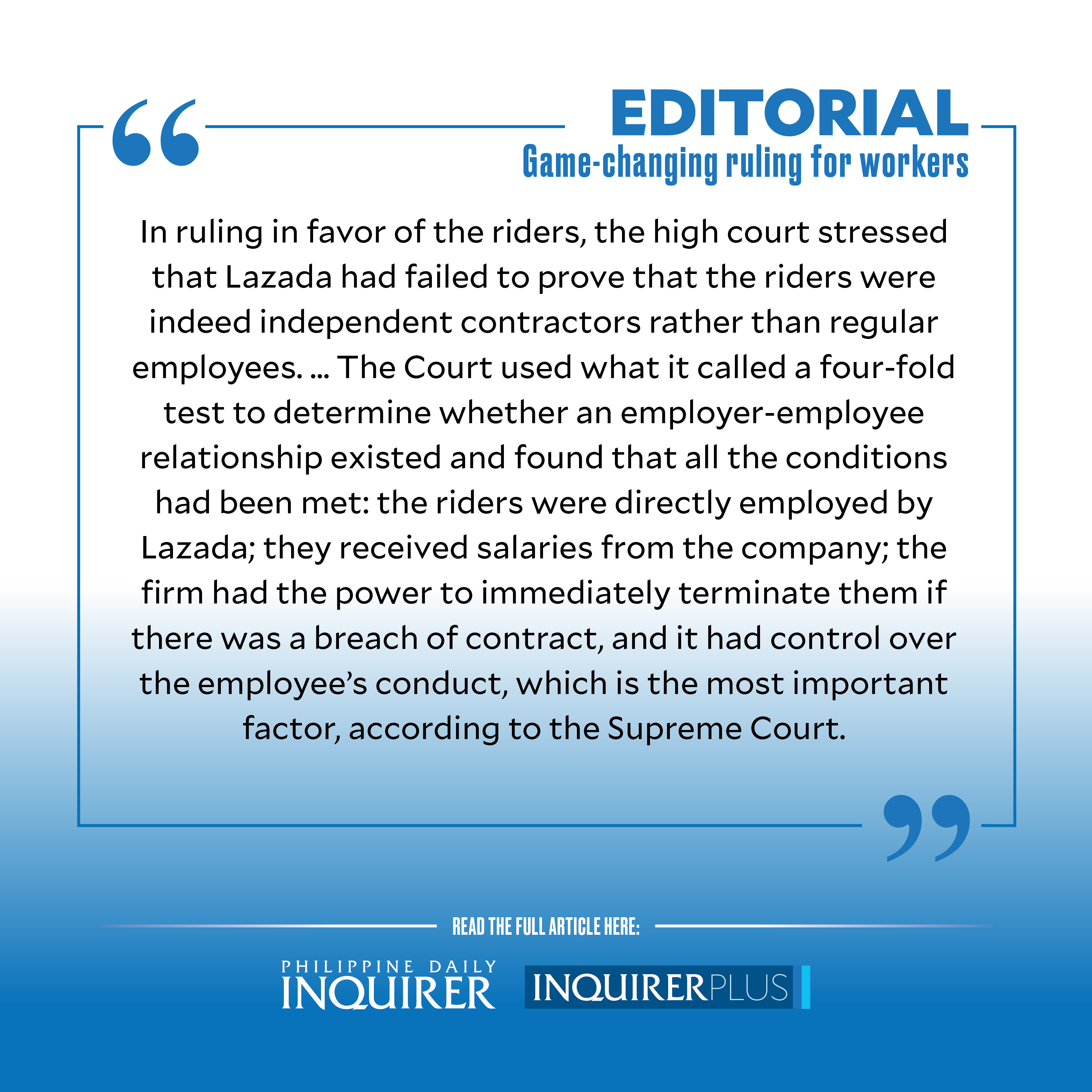Game-changing ruling for workers

Workers scored a major victory last week after the Supreme Court confirmed the employment status of five dismissed Lazada riders, and ordered the online shopping platform to immediately reinstate them with about five years’ worth of back wages and benefits.
In a Sept. 21 ruling made public last week, the high court’s second division unanimously upheld the illegal dismissal case filed in 2017 by the five couriers, and validated their “employer-employee” relationship with Lazada. The online platform hired the riders in 2016 to pick up items from sellers and deliver them to Lazada’s warehouse for a P1,200 service fee a day, under a one-year “independent contractor agreement.”
In 2017, however, the riders found that they had been removed from their usual routes and were no longer given any work, prompting them to file an illegal dismissal complaint against Lazada before the National Labor Relations Commission (NLRC). A labor arbiter subsequently dismissed the complaint on grounds that the riders were not regular Lazada employees, a decision upheld by the NLRC and the Court of Appeals but was reversed by the Supreme Court.
In ruling in favor of the riders, the high court stressed that Lazada had failed to prove that the riders were indeed independent contractors rather than regular employees. “When the status of the employment is in dispute, the employer bears the burden to prove that the person whose service it pays for is an independent contractor rather than a regular employee,” wrote division chair Senior Associate Justice Marvic Leonen. The Court used what it called a four-fold test to determine whether an employer-employee relationship existed and found that all the conditions had been met: the riders were directly employed by Lazada; they received salaries from the company; the firm had the power to immediately terminate them if there was a breach of contract, and it had control over the employee’s conduct, which is the most important factor, according to the Supreme Court.
The high court noted how Lazada required its riders to accomplish a route sheet, which kept track of their arrival, departure, and unloading times, and imposed on them a penalty of P500 on top of an item’s actual value if it gets lost. The Court also underscored how the service performed by the riders—the delivery of items bought and sold on the e-commerce site—was integral to Lazada’s business as an online shopping platform. As to the provision in the contract that expressly states that there is no employer-employee relationship—a clause cited by employers who wish to avoid the added costs of hiring workers as regular employees—the Supreme Court ruled that “protection of the law afforded to labor precedes over the nomenclature and stipulations of the contract … Thus, it is patently erroneous for labor tribunals to reject an employer-employee relationship simply because the contract stipulates that this relationship does not exist.”
The NLRC eighth division earlier cited similar grounds when it upheld the June 2022 ruling of a labor arbiter to accord regular employee status to the Davao City Foodpanda riders. The NLRC determined that they had been illegally dismissed and were entitled to P2.445 million in back wages, separation pay, and reimbursement of legal fees.
The widely cheered high court ruling was deemed a game-changer, with Federation of Free Workers president Sonny Matula hailing the Supreme Court for “[upholding] the fundamental right of workers to a regular job,” adding that “delivery riders in a similar situation may use this precedent in their complaint for regularization.”
Sen. Risa Hontiveros described the ruling as a “triumph and inspiration” for delivery riders. “Because of this decision, it is clear that our courts place a great value on the promotion of social justice and the defense of the rights of workers,” the senator noted. “This is just the first of many future victories for gig economy workers,” she added.
The Employers Confederation of the Philippines (Ecop), however, raised the valid point that the Supreme Court ruling cannot be summarily applied on all cases involving independent contractors, and that disputes should be judged according to their own merits. “It depends on the nature of employment. [The Supreme Court ruling] can’t be used as a basis for every case because conditions differ,” said Ecop president Sergio Ortiz-Luis Jr. There are indeed legitimate instances when there is no employer-employee relationship between two parties, such as when consultants are hired for short-term jobs with a specific scope, which are not essential to the company’s daily operations.
Still and all, the Supreme Court ruling sends a strong signal to corporations and entrepreneurs to evaluate how they are treating their workers, and whether they are given their due in terms of salaries and benefits that may have been sacrificed for profit’s sake. As Matula has said of this “historic” decision, “regular employment is the norm and not the other way around.”




















